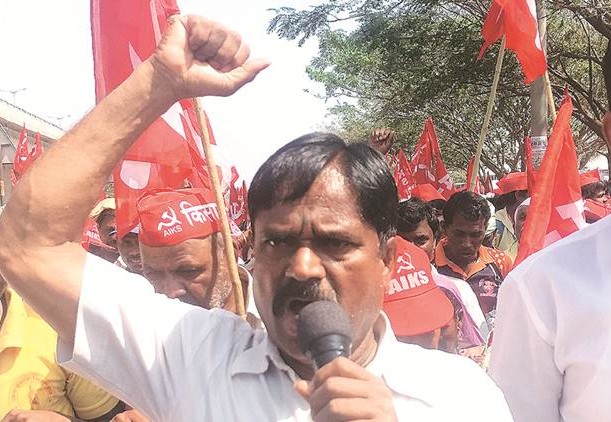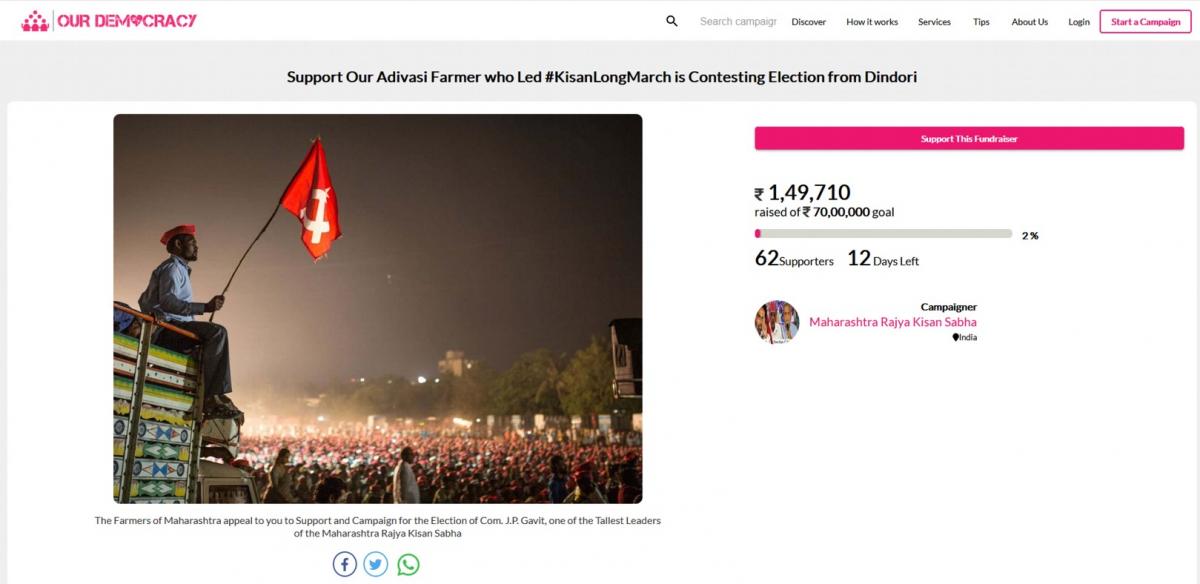The Man of the moment vows to fight against anti-farmer policies of the state and central governments

AN APPEAL FROM THE ADIVASI AND FARMER’S MOVEMENT
TO SUPPORT COMRADE J.P GAVIT’S ELECTION CAMPAIGN
https://www.ourdemocracy.in/Campaign/JPGavit
Sabrangindia appeals to all its readers to contibute to Adivasi Farm leader, Jiva Pandu Gavit’s Campaign
-Editors
Jiva Pandu Govit, popularly known as JP Gavit is all set to contest the Lok Sabha polls from Dindori Lok Sabha Constituency of Maharashtra on April 29 in the fourth phase of the elections. But as with all candidates who represent an alternate vision and politics, his crowd funding campaign has found, so far, just 62 takers! With 12 days left he has so far raised Rs. 1,49,710 and is way short of the necessary amount.
The hopes and dreams of several thousand forest dwellers, farmers and Adivasis, who have been demanding rights over forest land and land redistribution in the tribal areas of Maharashtra are so linked to Gavit’s victory.
In a nation struck by the agrarian crisis, Gavit is one of the key leaders who ignited a ray of hope in the form of Kisan long marches in Maharashtra in 2018. Mumbaikars, cynical and detached were moved to realise that the food in their homes and kitchens required much toiling and sacrifice.
The first Kisan march was so much more than a spectacle. The long march was an outcome of two decades of struggle by the Adivasi farmers for forest land rights. Gavit, who led it provided the context in his Mumbai speech, “Two years ago, more than one lakh farmers had protested in Nashik. Our 180-km six-day march started after the government did not fulfil our promises.”
Not only did this champion of land rights organise potable water and food packets and in coordination with other leaders Ajit Navale, Kisan Gujar and Ashok Dhavale, he stirred the soul of the rally. He led a massive rally of more than 35,000 peasants. As the march paved its way through a sleeping Mumbai, Gavit’s words roared, “Chala utha Kumbhakarna (Wake up O Sleeping ones)” through the streets, infusing the crowds with reverberating energy.
The farmers’ march was crucial in pointing out that the rights of farmers and Adivasis over land were central to the agrarian crisis gripping the country over decades, exacerbated especially by demonetisation introduced by the Modi government in 2016. Demonetisation exposed the fissures in the agricultural sector as small and landless farmers lined up to the banks for money and ultimately not able to buy seeds on time. This was the tipping point for the unrest in the sector and brought to the foreground several issues of the farming community including the demands for Minimum Support Price (MSP).
Political journey
Gavit’s leadership and insights have come from his lived experience. Himself belonging to the Adivasi community, he sharpened his politics and made some significant contributions to ensure land rights for Adivasis. He completed his graduation from Milind College in Aurangabad and worked as a clerk, when he came in contact with the Communist Party of India (Marxist). Mlind College was one of the institutes closely associated with Dr Babasaheb Ambedkar.
In the aftermath of the 1972 drought that had impacted as many as 25 million people, the CPI (M) had organised its first farmer protest in which Gavit participated. The relief measures initiated in Maharashtra that time were a result of public pressure and the responses by the government were called as “model programme” by economist Jean Dreze. This led to his initiation into the communist movement in the state.
Trained under veteran communist leaders such as Godavari Parulekar and Narendra Malusare, Gavit’s political career was shaped around championing the rights of the most marginalised, the Adivasis, forest dwellers, farmers around the issues of land titles and other problems. He contested Assembly elections in 1978, right after the Emergency. He won it with huge margins and since then has been elected seven times as the MLA.
Harbinger of rights of marginalised
Gavit has worked tirelessly in Dindori, Surgana and Kalwan and has been the MLA for seven times. The region also faces serious water challenges. Gavit has been consistently working to get some of these issues resolved.
Located in Nashik region, Dindori has a large population of Scheduled Tribes (36%). Dindori constituency was created on February 19, 2008 as a part of the implementation of the Presidential notification based on the recommendations of the Delimitation Commission of India constituted July 12, 2002. Dindori comprises of six Vidhan Sabha segments namely, Nandgaon, Kalvan, Chandwad, Yevla, Niphad and Dindori.
Surgana, a taluka in the Nashik district, is known for the program “Doorstep Ration Scheme” initiated by the CPI (M). A success story is that this scheme has been implemented in two-thirds of the 291 revenue villages in Surgana Tehsil. Many women farmers who walked in the long march seemed to believe that this reduced large-scale corruption in the PDS.
Milestones in the Struggle
President of the All India Kisan Sabha (AIKS) and CPI (M) leader Ashok Dhawale highlighted his contribution in fighting for the rights of the elderly. “Recently he fought for government pension for senior citizens and now 12,000 people have benefited from it in his constituency.” He added, “An equal number of people received land titles in January 2019, which is the highest in Maharashtra. He has started educational institutes to make opportunities available to tribal students in the area. Due to his work of so many years, a huge number of tribal and farmers participated in our long march last year.”
Playwright Ramu Ramanathan recalls Gavit’s words from two decades back in Surgana in a recent essay. He says, “Gavit’s rationale when I heard him in Surgana (two decades ago) was simple, “The high and mighty people of the world, practice the terrorism of money. These people are more powerful than emperors and army chiefs, even more than the Presidents and Prime Ministers. Their hands are never muddied or dirtied. They shoot no-one: they applaud the show. But behind-the scenes everyone works for them. The babus, the international experts, the IT army. This is how they rule our people: they are never elected, but they decide the wage levels plus subsidies for peasants and labourers.”
Gavit’s resolve
Gavit feels that the promises made to the farmers and Adivasis after the long march haven’t been fulfilled. The plight of the farming communities across Maharashtra accompanied by a deep concern and compassion for all marginalized people, he has resolved to take his fight ahead. “Now I am opposing the diversion of our water to Gujarat. Our tribal are thirsty, they need water here. This was one of the main demands during the march to Mumbai. I am also going to highlight the failures of the Modi government. There is distress among farmers, tribals and women. No one is happy with the Modi rule,” said Gavit in a Mumbaimirror interview.
Implementation of forest rights remain an unfinished project in the state. Though, after the long march, some initiatives were taken up by the government, the worrying trend that was noticed was that the average forest land area recognised for forest dwellers/claimants has decreased. Moreover, community forest rights claims are getting rejected at an ever increasing pace.
In these grim circumstances, will Gavit be the red flicker of hope?
